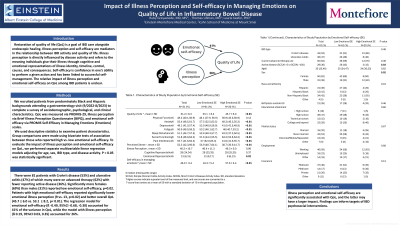Sunday Poster Session
Category: IBD
P0834 - Impact of Illness Perception and Self-Efficacy in Managing Emotions on Quality of Life in Inflammatory Bowel Disease
Sunday, October 27, 2024
3:30 PM - 7:00 PM ET
Location: Exhibit Hall E

Has Audio

Ruby Greywoode, MD, MS
Assistant Professor of Medicine
Montefiore Medical Center, Albert Einstein College of Medicine
Bronx, NY
Presenting Author(s)
Ruby Greywoode, MD, MS1, Thomas Ullman, MD1, Laurie Keefer, PhD2
1Montefiore Medical Center, Albert Einstein College of Medicine, Bronx, NY; 2Icahn School of Medicine at Mount Sinai, New York, NY
Introduction: Restoration of quality of life (QoL) is a goal of IBD care alongside endoscopic healing. Illness perception and self-efficacy are mediators in the relationship between IBD activity and quality of life. Illness perception is directly influenced by disease activity and refers to the meaning individuals give their illness through cognitive and emotional representations of illness identity, timeline, control, causes, and consequences. Self-efficacy is confidence in one’s ability to perform a given action and has been linked to successful self-management. The relative impact of illness perception and emotional self-efficacy on QoL among IBD patients is unclear.
Methods: We recruited patients from predominately Black and Hispanic backgrounds attending a gastroenterology visit (9/2022-8/2023) to complete a survey of sociodemographic, psychological, and clinical characteristics. QoL was measured via PROMIS-29, illness perception via Brief Illness Perception Questionnaire (BIPQ), and emotional self-efficacy via PROMIS Self-Efficacy in Managing Emotions (Emotions) scales. We used descriptive statistics to examine patient characteristics. Group comparisons were made using bivariate tests of association between those who reported high vs. low emotional self-efficacy. To evaluate the impact of illness perception and emotional self-efficacy on QoL, we performed separate multivariable linear regression models adjusting for age, sex, IBD type and disease activity. P < 0.05 was statistically significant.
Results: There were 81 patients with Crohn’s disease (53.1%) and ulcerative colitis (46.9%) of which many were on biologics (61.7%) with fewer (35.8%) reporting active disease. Significantly more females (68.9%) than males (31.1%) reported low emotional self-efficacy, p=0.02. Patients with high emotional self-efficacy reported significantly lower emotional illness perception (9 vs. 13, p=0.02) and better overall QoL (45.7 ± 6.0 vs. 53.1 ± 8.2, p< 0.01). The regression model for emotional self-efficacy (ß -0.49, 95%CI -0.68, -0.30) accounted for 41% of the variance in QoL, while the model with illness perception (ß 0.19, 95%CI 0.03, 0.35) accounted for 26%.
Discussion: Illness perception and emotional self-efficacy are significantly associated with QoL, and the latter may have a larger impact. Findings can inform targets of IBD psychosocial interventions.
Note: The table for this abstract can be viewed in the ePoster Gallery section of the ACG 2024 ePoster Site or in The American Journal of Gastroenterology's abstract supplement issue, both of which will be available starting October 27, 2024.
Disclosures:
Ruby Greywoode, MD, MS1, Thomas Ullman, MD1, Laurie Keefer, PhD2. P0834 - Impact of Illness Perception and Self-Efficacy in Managing Emotions on Quality of Life in Inflammatory Bowel Disease, ACG 2024 Annual Scientific Meeting Abstracts. Philadelphia, PA: American College of Gastroenterology.
1Montefiore Medical Center, Albert Einstein College of Medicine, Bronx, NY; 2Icahn School of Medicine at Mount Sinai, New York, NY
Introduction: Restoration of quality of life (QoL) is a goal of IBD care alongside endoscopic healing. Illness perception and self-efficacy are mediators in the relationship between IBD activity and quality of life. Illness perception is directly influenced by disease activity and refers to the meaning individuals give their illness through cognitive and emotional representations of illness identity, timeline, control, causes, and consequences. Self-efficacy is confidence in one’s ability to perform a given action and has been linked to successful self-management. The relative impact of illness perception and emotional self-efficacy on QoL among IBD patients is unclear.
Methods: We recruited patients from predominately Black and Hispanic backgrounds attending a gastroenterology visit (9/2022-8/2023) to complete a survey of sociodemographic, psychological, and clinical characteristics. QoL was measured via PROMIS-29, illness perception via Brief Illness Perception Questionnaire (BIPQ), and emotional self-efficacy via PROMIS Self-Efficacy in Managing Emotions (Emotions) scales. We used descriptive statistics to examine patient characteristics. Group comparisons were made using bivariate tests of association between those who reported high vs. low emotional self-efficacy. To evaluate the impact of illness perception and emotional self-efficacy on QoL, we performed separate multivariable linear regression models adjusting for age, sex, IBD type and disease activity. P < 0.05 was statistically significant.
Results: There were 81 patients with Crohn’s disease (53.1%) and ulcerative colitis (46.9%) of which many were on biologics (61.7%) with fewer (35.8%) reporting active disease. Significantly more females (68.9%) than males (31.1%) reported low emotional self-efficacy, p=0.02. Patients with high emotional self-efficacy reported significantly lower emotional illness perception (9 vs. 13, p=0.02) and better overall QoL (45.7 ± 6.0 vs. 53.1 ± 8.2, p< 0.01). The regression model for emotional self-efficacy (ß -0.49, 95%CI -0.68, -0.30) accounted for 41% of the variance in QoL, while the model with illness perception (ß 0.19, 95%CI 0.03, 0.35) accounted for 26%.
Discussion: Illness perception and emotional self-efficacy are significantly associated with QoL, and the latter may have a larger impact. Findings can inform targets of IBD psychosocial interventions.
Note: The table for this abstract can be viewed in the ePoster Gallery section of the ACG 2024 ePoster Site or in The American Journal of Gastroenterology's abstract supplement issue, both of which will be available starting October 27, 2024.
Disclosures:
Ruby Greywoode: Janssen – Grant/Research Support.
Thomas Ullman: BMS – Consultant. Pfizer – Advisor or Review Panel Member, Grant/Research Support.
Laurie Keefer: ardelyx – Consultant, Grant/Research Support. coprata health\ – Advisory Committee/Board Member. pfizer – Consultant. trellus health – Consultant, Stock-publicly held company(excluding mutual/index funds).
Ruby Greywoode, MD, MS1, Thomas Ullman, MD1, Laurie Keefer, PhD2. P0834 - Impact of Illness Perception and Self-Efficacy in Managing Emotions on Quality of Life in Inflammatory Bowel Disease, ACG 2024 Annual Scientific Meeting Abstracts. Philadelphia, PA: American College of Gastroenterology.
